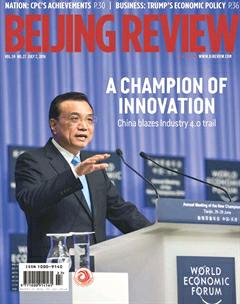Scaling New Heights
2016-07-27ByYuLintao
By+Yu+Lintao


The China-Russia relationship has been further elevated during Russian President Vladimir Putins first visit to China this year. During Putins one-day, whirlwind trip to Beijing on June 25, the two countries inked more than 30 cooperation deals in trade and other fields. More importantly, Chinese President Xi Jinping and Putin signed and issued a joint statement on overall cooperation between China and Russia and two other statements on enhancing global strategic stability and on promoting the development of cyberspace through coordination. Foreign ministers of the two countries also issued a declaration on the promotion of international law.
“The outcome of the visit speaks volumes of how close the two countries are and how much they have in common in their stances,” said Hong Lei, spokesman for the Chinese Ministry of Foreign Affairs. “It showcases their conviction in the spirit of strategic coordination and long-lasting friendship as well as their commitment to and achievement in strengthening mutual support, building political and strategic mutual trust, and deepening [their] comprehensive strategic partnership of coordination.”
This year marks the 15th anniversary of the signing of the China-Russia Treaty on Good-Neighborliness, Friendship and Cooperation and the 20th anniversary of the establishment of the China-Russia strategic partnership of coordination. In an interview with Xinhua News Agency ahead of his most recent trip to China, Putin hailed the current bilateral relations as being at a level that“probably has never been reached in our relationship in the past.”
Changes in the two countries internal environments as well as in the external environment, however, imply the need for deeper and broader bilateral cooperation.
In economic terms, both countries have faced tough challenges in growth over recent years. The growth rate of the Chinese economy is slowing from double digits to a medium-high level of around 7 percent, while the countrys industrial transformation and upgrading are underway. As for Russia, the Ukraine-related Western sanctions and low international oil prices are forcing its economy to shift from its traditional reliance on exports of energy and raw materials to new opportunities and to turn to Asian markets with China as a priority. The cooperation deals signed during Putins recent Beijing trip, including heavyweight collaboration projects such as long-range aircraft, heavy helicopters and the high-speed MoscowKazan railway, demonstrate the trend well.
China is actively promoting the building of the Silk Road Economic Belt and the 21stCentury Maritime Silk Road (together known as the Belt and Road Initiative), which aim to improve infrastructure in countries along their routes and strengthen regional interconnectivity. Since Russia needs to ease the current pressure on its economy, it can work on many projects, including railway construction, under the framework of the Belt and Road Initiative.
Moreover, the Belt and Road Initiative complements Russias proposed Eurasian Economic Union—which currently groups Russia, Kazakhstan, Belarus, Kyrgyzstan and Armenia. The synergizing of the two initiatives can fully play China and Russias advantages in terms of market size, technology, and natural and human resources, creating favorable conditions for development of the whole region.
Compared with the economic cooperation deals, the joint documents that elaborate the positions and propositions of China and Russia on major international issues, including enhancing global strategic stability, advancing the development of information and cyberspace, and promoting international law, are more eye-catching for the world at large.
The statement on enhancing global strategic stability, for example, notes that some countries and military-political alliances seek decisive advantages in military and relevant technology, so as to serve their own interests through the use of force or the threat of force in international affairs. Such a policy has resulted in the out-of-control growth of military power and has shaken the global strategic stability system. The document expresses concern over the unilateral deployment of anti-missile systems all over the world, which it says is non-constructive and has negatively affected global and regional strategic balance, stability and security.
The statement calls on all countries to solve disputes through positive and constructive dialogue and to promote mutual trust and cooperation. China and Russia are willing to strengthen dialogue, cooperation and exchanges with the international community on the basis of the above principles, the statement says.
This is the first time that China and Russia have published joint documents on global security and international law. Though they do not mention any third party, the United States and its alliances such as NATO, which seek unilateralism, are widely seen as being criticized by the documents.
Instead of being offensive, however, the documents are the collective responses of China and Russia toward the rising potential threats they face.
Since the Russia-West honeymoon eventually ended following the deterioration of the Ukrainian crisis, Moscow now feels more and more confined and threatened by NATOs continual eastward expansion and its military deployment approaching Russia. The Wests move to squeeze Russias strategic space has not yet stopped.
In the meantime, although China has been trying to establish a new type of relationship with major nations including the United States, the worlds sole super power is seemingly unwilling to give up its hegemonic attitude to international affairs. Re-focusing its military on Asia and strengthening its military alliances in the region put great pressure on China. And, instead of helping to settle the issue, U.S. involvement in the disputes in the South China Sea has inflamed tension in the region.
Nevertheless, although the joint documents of China and Russia demonstrate comprehensive mutual support, they do not imply an alliance exists between the two neighbors. As top leaders of the two states have repeatedly mentioned, though China and Russia will support each other comprehensively in all vital areas, they have no need to forge the type of alliance characteristic of the Cold War era, but this also means that it is not easy for Washington to break the strategic balance between the three countries.
